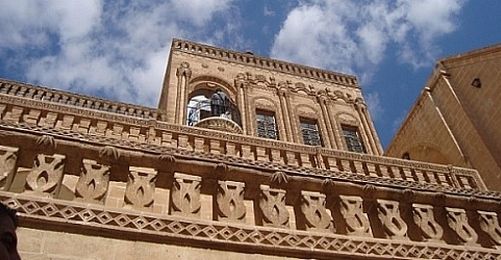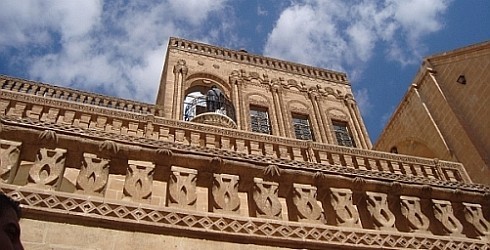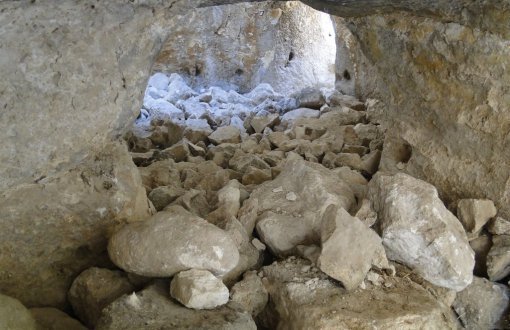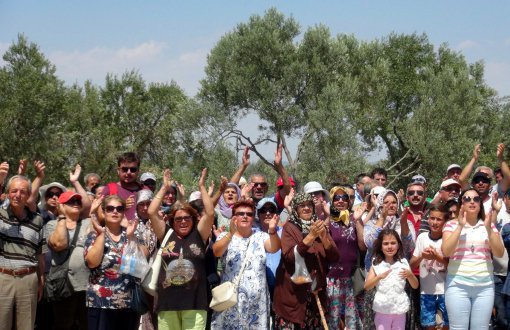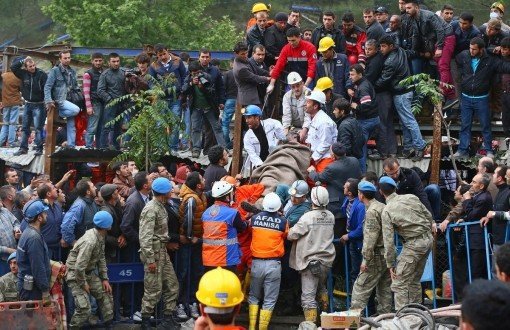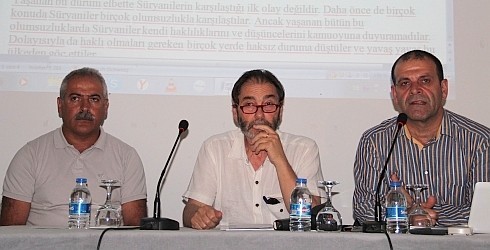
Some 300 individuals, including writers, academics and artists, have signed a petition to protest a verdict by the Supreme Court of Appeals to hand over the historical Syriac Christian Mor Gabriel Monastery in the southeastern province of Mardin to the treasury.
Established in 397 A.D., the Mor Gabriel Monastery bears exceptional significance for Syriacs, as it stands on par with Muslims' "Al Aqsa Mosque" for the Syriac community, trains half of all their clergy and has enabled the survival of the Syriac language, according to Tuma Özdemir, the head of the Mesopotamia Culture Association.
Prof. Cengiz Aktar, Tuma Özdemir and Tuma Çelik, the owner of the Mardin-based Syriac journal Sabro, came together in Istanbul's Cezayir Meeting Hall to expound on the petition campaign entitled "Turkey is the Syriacs' Homeland, and the Mor Gabriel Monastery is not an Occupier."
The monastery's significance derives not from its material but its spiritual value, Tuma Çelik said.
"This verdict by the court has led to the perception that this country does not want the Syriacs who had just begun to return [from abroad] in recent years," he said.
The Syriac community used to have their own schools in Turkey until 1928, but the Syriac Patriarchate in Mardin's Midyat district was forced to move to Damascus in 1930, while Syriacs themselves also had to take refuge abroad in the 1960s, Çelik explained.
"The Syriacs saw some optimism in recent years and responded to it by starting to return [from abroad.] The state, however, saw they were returning and took a stand against this. [They] made [a deliberate] decision against Syriacs. We do not want 'tolerance' as in Ottoman [times,] we want to cohabit," he said.
Çelik added they wanted to create public awareness through the petition by accruing support behind the Syriac community that had been forced into silence for long years in Turkey.
"New constitution ought to go beyond the Treaty of Lausanne"
Prof. Aktar also said the verdict of the Supreme Court of Appeals reflected an intent to tell Syriacs, the "stepchildren" of the country who bear the status of a minority due to the Laussane Treaty of 1923, that they are not citizens of the Republic of Turkey.
The expropriation of the Mor Gabriel Monastery at a time when the Turkish government is busy returning estates owned by the Bulgarian and Rum (Anatolian Greek) communities back to their original owners reflects a remittent policy, Aktar said.
The new constitution that is in the works ought to go beyond the Treaty of Lausanne and put an end to the injustices against minorities once and for all, he added.
The defendant parties would like to appeal the verdict to the European Court of Human Rights (ECHR,) but the reasoned decision has to arrive first, according to the existing body of legislation. If the reasoned decision fails to arrive until Sept. 26, however, then the defendant parties will first have to appeal to Turkey's Constitutional Court due to recent amendments.
Around 20,000 Syriacs are currently living in Turkey. 15,000 of them reside in Istanbul, while the remainder is located in Mardin and its vicinity, the Syriacs' traditional homelands called "Turabdin."
Background
The heads of three villages in Mardin's Midyat district filed a complaint with the Treasury in 2008 during cadastral work in the area on the grounds that the monastery was occupying 276 decares of territory owned by local villagers.
The treasury filed a "land registration" suit, and the court subsequently dismissed the case, arguing that the church had been in possession of the estates in question since archaic times, that it had declared its estates prior to the 1936 Proclamation and had been paying its taxes on a regular basis after 1937.
The treasury then proceeded to appeal the decision, and the 20th Section of the Supreme Court of Appeals subsequently claimed the defendants had not presented any tax records pertaining to their real properties despite the earlier court statement that the church had been paying its taxes since 1937. The Supreme Court of Appeals further argued the defendant parties had not presented any documents regarding their declaration to the Foundations Directorate General in 1936.
The monastery responded by indicating they had already presented the relevant documents in 2009 and attached them to the file once more, but to no avail.
You can visit the website "Beraber Büyüdük Bu Ülkede" ("We Grew up Together in This Country," in reference to an old, popular song) to join the signature campaign. (NV)





